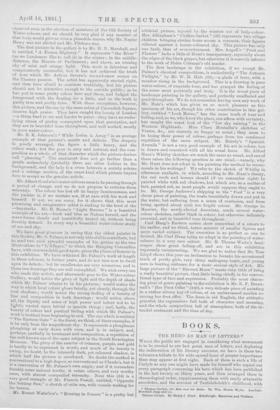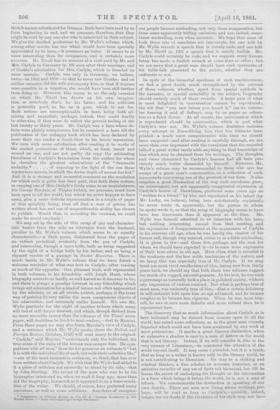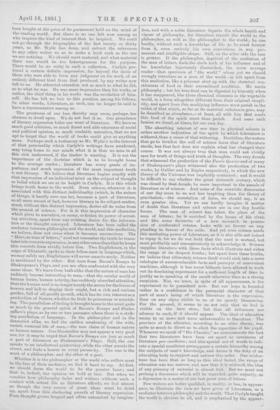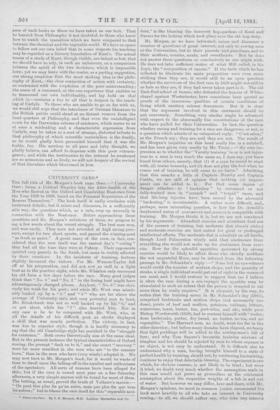BOOKS.
THE HERO AS MAN OF LETTERS.* WHILE the public are engaged in considering what monument is to be erected to our last great man of letters, and deploring the indiscretion of his literary executor, we have in these two volumes a tribute to his wide-spread fame of grouter importance than may appear at first sight. Each of them is such a life of Carlyle as any one might have made for himself who copied out every paragraph concerning his hero which has been published in the last twenty or thirty years, and then arranged them in chronological order, supplementing them with easily attainable anecdotes, and the account of Teufelsdrockh's childhood, with
* Thomas Carlyle; the Jima and his Books. By Win. Howie VT) Ile. London: Marshall Jspp and 0o.
Thomas Carlyle. By Henry J. Nicol. Edinburgh: Maeniven and Wallace. Scotch names substituted for German. Both have been read by us from beginning to end, and we presume, therefore, that they might be read by any one else who is interested in their subject. We give the decided preference to Mr. Wylie's volume, which, among other merits, has one which would have been specially appreciated by its hero,—it possesses an index. It seems to us more interesting than its companion, and is certainly more accurate. Mr. Nicoll has an account of a visit paid by Mr. and Mrs. Carlyle to Germany (p. 29) soon after their marriage, and of Goethee admiration for Mrs. Carlyle, which is founded on some mistake. Carlyle was only in Germany, we believe, twice—in 1852 and 1858—so that he never saw Goethe; and on neither occasion did his wife accompany him, so that if degrees were possible iu a negation, she would' have been still farther from doing so. However, this seems to us the. only occasion on which Mr. Nicoll has drawn on his own imagina- tion, or somebody else's, for his facts ; and his criticism is generally good, as far as it goes, which is not far, Both notices are unexceptionable in tone, being both ad- miring and impartial; perhaps, indeed, they could. hardly be otherwise, if they wore to reflect the general feeling of the last twenty or thirty years. Mr. Carlyle was a hero whose de- fects were plainly conspicuous, but he remained a hero till the publication of the unhappy book which has been declared by more than one reader a death-blow to his heroin reputation. We turn with some satisfaction after reading it to works of the modest pretensions of these, which, at least, insult and wound no one and are not guilty (to copy the misleading literalness of Carlyle's translation from the author for whom he cherishes the greatest admiration) of the "damnable
audacity.* of exposing to the light of the sun these mysterious secrets, in which the divine depth of sorrow lies hid." And it is a strange and mournful comment on the revelation for which such a; price has been paid, that both these writers, in copying one of Mrs. Carlyle's lively notes to an acquaintance, Sir George Sinclair, of Thurso (which, we presume, must have been open to all the world, but which we never happen to have seen), give a more definite representation iu a couple of pages of this sprightly being, than all that a man of genius has written about her, and one of unquestionable ability has chosen to publish. Would that, in recording the contrast, we could make its moral emphatic !
We may set by the side of this scrap of gay and character- istic banter froM the wife an utterance from the husband, peculiar to Mr. Wylie's volume, which seems to us equally characteristic,—a little poem, disinterred from the pages of an extinct periodical, evidently from the pen of Carlyle, and interesting, though a mere trifle, both as being suggested by the sight of a bridge built by his father, and as being a rhymed version of a passage iu ,S'en'ior Besartns. There is much beside in Mr. Wylie's volume that we have found a welcome reminder of what was best in Carlyle, atter reading so much of the opposite. One pleasant trait, well represented in both volumes, is his friendship with Leigh Hunt, whose biography seems to us hardly so well known as it deserves to be ; and there is always a peculiar interest in any friendship which brings out admiration for a kiud of nature not often appreciated by the admirer, or at all events (which, perhaps, is the truer way of putting it) very unlike the more conspicuous objects of his admiration, and • extremely unlike himself. We owe Mr. Wylie gratitude for the sight of another tribute which many will feel of still deeper interest, and which, though derived from no more recondite source than the columns of the Times' news- paper, will doubtless be fresh to most readers,—that to Mazzini.
From these pages we may also learn Mazeini's view of Carlyle, and a sentence which Mr. Wylie quotes (from the British and Foreign Renew, October, 1843) will scud many to the original.
"Carlyle," said Mzslui," nederstaeds only the individual, the
true sense of the unity of the human race escapes him. He sym- pathises with all men," (how far too generous an estimate!) " but
it is with the individual life of each, not with their collective life," —one of the most instructive sentences, we think, that has ever been written about Carlyle. We wish that Mr. Wylie had added to it a piece of criticism not unworthy to stand by its sides—that
by John Sterling. His review of the man who was to be his biographer interested us, when we read it long ago, more than
did the biography, inasmuch as it appeared to us a truer revela- tion of the writer. We should, of course, have preferred many omissions, as well as some additions. Anecdotes of eouspicu-
• Tran,,hual,n of WiMattit Noisier. In Vol. IV. of German Romance," p. 112. Goinbe wrote Linn 5erdammutigemardigii Frechliolt." ons people 'become misleading, not only from exaggeration, but from some apparently trifling omission, and are, indeed, some- times misleading, even when accurate. We hope that some of both these sets of anecdotes are inaccurate, for one told. by Mr. Wylie records a speech that is merely rude, and one told by Mr. Nicoll (p. 120) a speech that is merely foolish. Mr. Carlyle could certainly be rude, and we suppose every human being hae made a foolish remark at seine time or other ; but we are sorry that a great man should have such specimens of his table-talk presented to the public, whether they are authentic or not.
In spite of the immortal specimen of such reminiscences, we feel a great doubt, much strengthened by the perusal of these volumes, whether, apart from special aptitude in the narrator, or special suitability iu the subject, biography should embody much of these records. A large part of what is most delightful in conversation cannot be reproduced;.
the wit that " you saw before you heard it " (as we remem- ber hearing it said of Jeffrey), may be on paper as colour- less as a dried flower. At all events, the conversation which is reproduced should be conversation, which is just what Carlyle's was not. Mr. Wylie's volume doubtless includes every attempt at Boswellizing him that has hitherto been printed—a much more comprehensive title than we should.
have supposed—and after reading it carefully through, we are more than ever impressed with the conviction that the recorded talk of a great writer rarely adds anything to that knowledge of him which may be obtained from 'his writings. The thoughts and views chronicled by Carlyle's hearers had all been pre-.
viously much better chronicled by himself. However, Mr- Wylie'e volume may be recommended to those who care for scraps of a great man's conversation, as a collection of such memoranda concerning one of the greatest of our time. It also: supplies a good. illustration of the way such anecdotes grow,. an extravagant, but not apparently exaggerated expression of Carlyle's horror of Darwinism, produced some years ago as " written to a friend " by him, and repudiated on his behalf (by Mr. Lecky, we believe), being here satisfactorily explained ; he never wrote it, apparently, but the person to whom he spoke wrote it, so that the scrap of biography seems to have- been less inaccurate than it appeared at the time. Mr..
Wylie was himself admitted to an interview with his hero, but nothing interesting ensued from that meetiug, and his expressions of disappointment at the appearance of Carlyle in his extreme old age, when he was hardly the shadow of his former self, though very natural, seems to ua a little misleading.. It is given to few—and those few, perhaps, not the men for whom we should have expected it—to become more expressive of their true selves in old age. More often what is revealed is the weakness and the less noble tendencies of the nature, and we fancy this was especially true of Mr. Carlyle. If we may trust our most vivid recollections of him, dating now from thirty years back, we should say that both these two volumes suggest too much of a rugged, uncouth peasant. At his best, he was such a personage as naturally took a place in polished society, without any impression of violent contrast. But what is perhaps trne of most men, was eminently true of him,—that a certain deficiency in self-restraint told upon him as age advanced, and he became rougher as lie became less vigorous. When he was most him- self, he was at once more definite and more refined than he is represented here.
The discovery that so much information about Carlyle as is. here indicated may be derived from sources open to all the world, has raised some reflections as to the great man recently departed which could not have been awakened by any work of more pretensions. It marks a great literary distinction, when so extensive a shadow is cast by a man of letters on the world, that is not literary. Indeed, if we will consider it, this is the very essence of Literature,—to command the attention of the world beyond itself. It may seem a paradox, but it is a truth,.
that as long as a writer is known only to the literary world, he is not contributing to literature. He may be a striking and original thinker, a fine scholar, an accurate historian, or an attentive recorder of any set of facts not historical, but till he learns the secret of embodying his thought or his information in a form which brings it before tho world, he is not a man of letters. We commemorate the distinction in speaking of our own dearth. There are men now living whose writings, per- imps, will be read as long as Carlyle's,—possibly, indeed, longer, for we doubt if the vividness of his style may not have been bought at the price of its permanent hold on the mind of the reading world. But there is no one left now among us who inspires the kind of interest that ho inspired. We could not go through the biographies of the last twenty or thirty years, as Mr. Wylie has done, and extract the references to any other writer no as to make a book such as the one we are noticing. We should want material, and what material there was would be too heterogeneous for the purpose. There would be no unity in such a collection. Carlyle pro- duced a certain definite impression, far beyond the circle of those who were able to form any judgment on his work, of an entirely different kind from that produced by any writer now left to us. He attracted attention not so much to what he did, as to what he was. He was more impressive than his works, or rather, the chief thing in his works was the revelation of him- self. He has left no heir to this position among his fellows. In other words, Literature, as such, cau no longer be said to have a representative among us.
The greatness of our loss thereby may seem, perhaps, too obvious to dwell upon. We do not feel it so. Our abundance of literary expression hides our want otliterature. We have so much good criticism, so much fluent and able utterance of social and political opinion, so much readable narrative, that we are apt to forget that the world of books could give us anything more. Perhaps such a testimony as Mr. Wylie's to the interest of that personality which Carlyle's writings have awakened, may bring home to our minds what it is that we miss in all this rich underwood, if the timber is wanting. It is not the importance of the doctrine which is to be brought home to the average reader ; literature has every grade of im- portance, and much expression of the most important truth is not literary. We believe that literature begins exactly with that impression of an individual mind on the subject of thought or belief which we see at its height iu Carlyle. It is this which brings truth home to the world. Even science, wherever it is associated with this distinct individuality (which, in the nature of things, it hardly ever can be), becomes a part of literature, as all mere record of fact, however literary in its subject-matter, must, without this distinct impression, derive all its value from the ground of science. For it is this impression of character which gives to narrative, or essay, or fiction its power of arrest. ing attention, apart frOm any existing desire for the informa- tion or the thought conveyed. Literature has been called the mediator between philosophy and the world, and this mediation, we believe, does not cease when it becomes unconscious. The " Hero, as man of letters," need not remember the truth he trans- lates into concrete expression, in any other sense than that he keeps this concrete form vividly before him. Two Englishmen, in the reign of Elizabeth, spoke to their fellow-men in language which, we may safely say, Englishmen will never cease to study. Neither is mentioned by the other. But turn from Bacon's Essays to Shakespeare's Plays, and you are often confronted with the very same ideas. We learn from both alike that the nature of man has suddenly become interesting to man,—that the secular world of human desire, human activity, has suddenly absorbed attention; that the human soul is no longer merely the arena for the forces of heaven and hell to display their might, but a rich and various garden, full of all goodly growth, which has its own interest as a production of Nature,whether its fruit be poisonous or nourish- ing. This parallelism of feeling is brought home to the mind quite :as much by the general spirit of Bacon's Essays and Shake- spgare's plays, as by one or two passages where there is a strik- ing parallelism of language. In the philosopher and in the -dramatist alike, we feel the sudden awakening of the wide, varied, unmoral life of man,—the new claim of human nature as human nature. Our illustration may not appear a very good one, for it may be urged that Bacon's Essays are just as much a part of literature as Shakespeare's Plays. Still, the one speaks to an intellectual aristocracy, while the other arrests the crowd, and finds a hearer in every passer-by. The one is the work of a philosopher, and the other of a poet.
Whether it is the philosopher or the world who suffers most in the loss of their mediator, we find it hard to say. At first, we should deem the world to be the greater loser ; and that is, indeed, the opinion we hold at last. But when we consider how philosophy fades and withers without such a contact with actual life as literature affords, we feel almost as though the very source of great ideas must be dried up, apart from this sheltering growth of literary expression. Pure thought grows languid and effete untouched by imagina- tion, and with a noble literature departs the whole health and vigour of philosophy, for literature reveals the world to the philosopher, as well as the philosopher to the world ; ho can hardly, without such a knowledge of life as he must borrow from it, even embody his own convictions in any per- manent and intelligible shape. Still, ou the other side the loss is greater. If the philosopher, deprived of the mediation of the man of letters, finds the circle both of his influence and of his knowledge injuriously diminished, the mere average reader—that specimen of " the world " whom yet we should wrongly introduce as a man of the world—is left apart from this mediation, like a prisoner shut up with the chemical con- stituents of food in their uncombined condition. He needs philosophy ; but his true.food can be digested by him only when it has reappeared, like these chemical elements in the vegetable world, in a form altogether different from their original simpli- city, and apart from this modifying influence must perish in the midst of that which, as far as its material substance goes, may be described as abundauce,—at least, all with him that needs this food of the spirit must thus perish. And some such famine we dread, at times, for our own day.
The absorbing interest of our time in physical science is rather another indication of the spirit by which Literature is withered, than a cause of that withering. Doubtless, the waters that go to fertilise the soil of science leave that of literature sterile, but that fact does not explain what has changed their coarse. It was not always true that mau could not vividly care for truth of things and truth of thoughts. The very decade
that witnessed the production of the Faerie Qimeeae and of many of Shakespeare's plays witnessed also the production of two
works, by Galileo and by Kepler respectively, in which the new theory of the Universe was implicitly contained ; and it would be difficult to say whether the great sixteenth century, which was closed by that decade, be more important in the annals of literature or of science. And some of the scientific discoveries of our day seem to us not less inspiring than the theory of gravitation,—the correlation of force, we should say, is an.
even greater idea. Yet we can hardly imagine it matter of doubt that literature and science are iu our day hostile forces. The man of science has taken the place of the man of letters ; lie is enriched by the losses of his rival, and like some favourite of a new monarch iu posses- sion of confiscated estates, looks with no favour on any pleading in favour of the exile. And yet even science needs this mediating power of Literature, as it is also able not indeed to repay it, for we do not hold that the need is mutual, but most profitably and remuneratively to acknowledge it. Science supplies literature with those facts which illustrate and widen the range of its deepest truths ; but apart from these truths, we believe that ultimately science itself would sick into a mere catalogue of unrememberable facts and purveyor of convenient machines, although it has never hitherto been allowed to work out its desolating experiment for a sufficient length of time to justify us in speaking of the result otherwise than a3 a strong suspicion. Nor, we trust, in spite of all appearances, is the experiment to be permitted now. But our hope is founded rather in a confidence in the perennial character of that part of man's being of which literature is the exprssion, than on any signs visible to us of its speedy blossoming. For the present, it seems to us not only that no bud is visible on the bare stem, but that all influences are adverse to such, if it should appear. The ideal of education seems to us more and more unfavourable to literature. The province of the educator, according to an older theory, was quite as much to direct as to elicit the capacities of his pupil. Whenever we speak of "the Classics," we commemorate the fact that two literatures have been set apart as specimens of
literature per excellence ; and this special use of words to indi- cate a special excellence presupposes a certain hierarchy among the subjects of man's knowledge, and deems it the duty of an
educating body to support and enforce this order. Our misfor- tune has been that as long fts this ideal lasted, the range of education was too narrow, and now that it is widened, the idea of any primacy of material is almost lost. But we must not prolong a discussion which will be regarded, quite unjustly, as a digression iu a notice of our last great man of letters.
Few writers are better qualified, iu reality, or less, in appear- ance, to illustrate the view we have given of Literature, as a mediator between philosophy and the world. That Carlyle taught the world is obvious to all, and is emphasised by the appear- ance of such books as those we have taken as our text. That he learned from Philosophy is not doubtful, to those who know how to watch the transition which we have compared to that between the chemical and the vegetable world. We have no space to follow out our own belief that in some respects his teaching may be regarded as a literary translation of Kant's. The actual traces of a study of Kant, though visible, are indeed so few, that we should have to rely, in such an endeavour, on a comparison between the spirit of the two doctrines, which is impossible here; yet we may leave with the reader, as a parting suggestion, our strong suspicion that the most striking idea in the philo- sophy of Kant,—the close connection of action with certainty, as contrasted with the scepticism of the pure understanding ; the sense of a command, as the one experience that enables us to transcend our own individuality, and lay hold on that which is,---contains a key to all that is deepest iu the teach- ing of Carlyle. To those who are unable to go so far with us, we would still urge that the introducer of German literature to the British public could stand at no distant remove from the head-quarters of Philosophy, and that even the unintelligent scorn for the Darwinian scheme of existence, which seems to us at once a misleading and a characteristic expression from Carlyle, may be taken as a sort of strange, distorted tribute to that philosophy of which scientific materialism is the deadly, as he would gladly have persuaded himself that it was the feeble, foe. His services to all pure and lofty thought, we gladly believe, can afford to dispense with this poor extrava- gance; and while the testimonies to the interest he awakened are so nu m crone and so lively, we will not despair of the revival of that literature which blossomed in him..





































 Previous page
Previous page